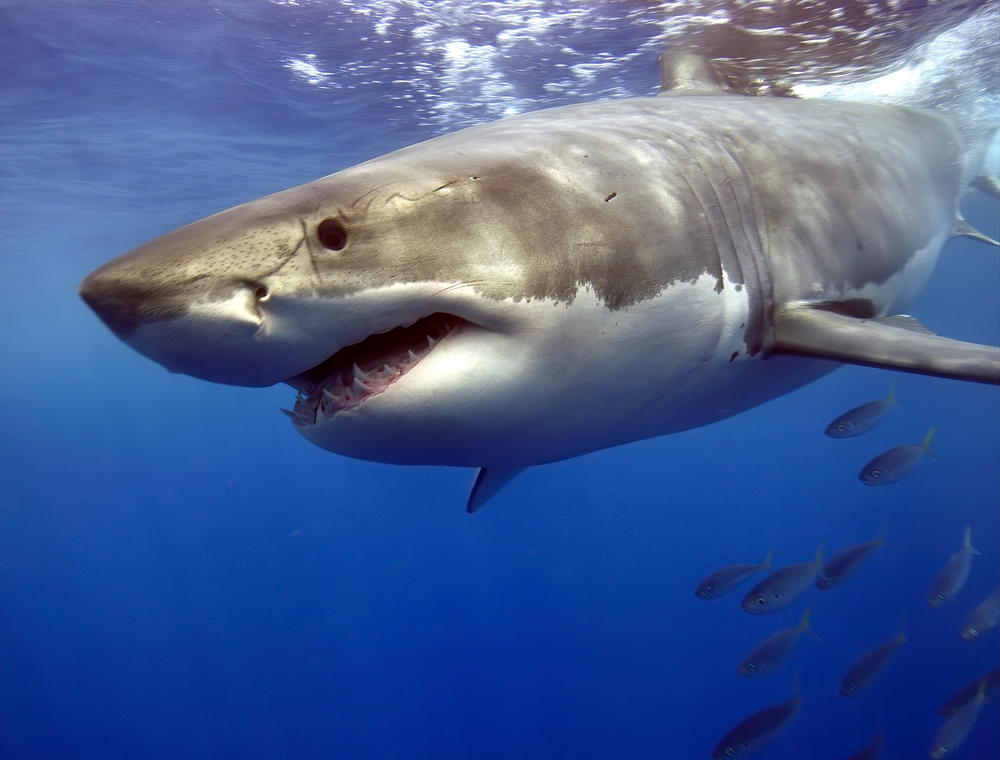Blue whales are the Earth’s largest species and can stretch beyond 100 feet in size — even their young measure at above 20 feet on average. Great white sharks, meanwhile are quick, powerful, and highly efficient predators. What happens when these two face off and do great white sharks actually pose a threat to these true titans of the ocean?
The short answer, says Chandra Salgado Kent, marine ecologist and associate professor at Edith Cowan University, in most cases, likely not. Fit adult blue whales are likely far too large and powerful to be seriously threatened by sharks, even great whites. They possess both speed and high stamina to outrun a shark that’s built predominantly for sharp, short bursts of speed to capture its prey.
Scientists do spot whales with tell-tale bite marks on them, suggesting some encounters with enterprising sharks at some stage of their life. It’s also known that sharks scavenge dead whales, blues and others.
“We’re seeing sharks attacking whale carcasses and ripping blubber and muscle from them,” says Salgado Kent. “So, the question then is has this attack happened before the whale had died or afterward?”
Great Whites Scavenging Whales
There have been, however, no observations reported of great white sharks actually attacking and killing blue whales, leading scientists to believe this occurrence is quite unlikely. Though sharks have taken down other species; in 2020, scientists captured remarkable drone footage of a great white drowning a humpback whale that had become caught in a net.
“Those cases probably occur when there’s a whale that’s either in a weakened state, is compromised, or is simply very young and doesn’t have the strength and stamina to evade predation,” says Salgado Kent. “There’s growing evidence that certainly, it seems that scavenging whale carcasses is potentially an important source of energy for many species of shark.”
It seems then that blue whales are far more likely to succumb to a human-caused death than at the jaws of a shark.
Read More: Great White Sharks Band Together to Prey on Whales
Could Killer Whales be Attacking Blue Whales?
Across the globe, ship collisions wound and kill whales, including gigantic blues. Studies in some parts of the oceans rank these strikes as a potential leading cause of death that’s prohibiting population recovery.
Other threats such as pollution, overfishing, entanglement in fishing gear and climate change all likely stack up as far greater threats to whales than any sceptical threat posed by shark attacks. But as Salgado Kent explains, we still have much to learn about actual causes of blue whale mortality across the globe.
If sharks attacking whales is fleetingly rare, it is known that some orca pods – also known as killer whales – are adept whale killers. Scientists have recorded attacks on species such as beaked whales, gray whales, and even blue whales.
In a striking case, researchers observed a pod of orcas purposefully hunting and killing blue whales off the coast of Australia. In a gruesome series of events, the orcas ate the tongue of their victim and lifted its corpse from the sea floor for the whole group to feast on.
In 2023, researchers released footage of orcas attacking beaked whales. It’s thought that this species may have evolved their deep diving ability that allows them to reach depths of up to 3,000 meters precisely to escape such attacks by killer whales. It’s also known that orcas will hunt and kill sharks, including great whites.
“Orcas do target beaked whales in certain areas of the world,” says Salgado Kent. “But in these locations they certainly will take the opportunity if they feel they have a chance to prey on other marine mammals. There have certainly been instances of blue whale chases and blue whale attacks.”
Read More: Orcas May Be Attacking Larger Fin Whales as a More Efficient Food Source
Ocean Dynamics Shift with Climate Change
This current state of play in the oceans – that sharks may kill an injured, trapped, or a recently born whale if given the opportunity, but most likely predominantly play the role of scavenger – could well change in the future due to climate change.
Salgado Kent says that the body condition and fitness of certain species, such as blue whales, could be impacted as the productivity and the reliable sources of of prey in their foraging grounds shifts. These gigantic beings feed on krill, tiny shrimp-like creatures, and populations could be heavily impacted by changing ocean conditions as the world warms.
“Because of climate change and impacts on productivity, whales might lose their body mass and their body condition. The mothers need to give milk to their calves, and they may just not have sufficient energy to do which means the survival of their young may be impacted,” Salgado Kent explains. “The potential to be preyed upon potentially increases because they might not have the fitness or they might become susceptible to diseases.”
If sharks will eventually begin to prey upon species such as blue whales, or at least their vulnerable young, under such a scenario remains highly questionable; orcas may well play that role as some pods do already. The reality is that whether or not it is a great white or another shark that ultimately deals that killer blow, life is expected to become far harder for the world’s largest creature as climate change advances.
Read More: How Many Whales Are Left In the World?
Article Sources
Our writers at Discovermagazine.com use peer-reviewed studies and high-quality sources for our articles, and our editors review for scientific accuracy and editorial standards. Review the sources used below for this article:
Sean Mowbray is a freelance writer based in Scotland. He covers the environment, archaeology, and general science topics. His work has also appeared in outlets such as Mongabay, New Scientist, Hakai Magazine, Ancient History Magazine, and others.
















.jpg?itok=F2C4uk0x)




Discussion about this post